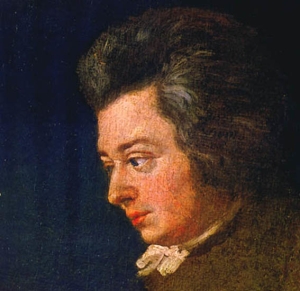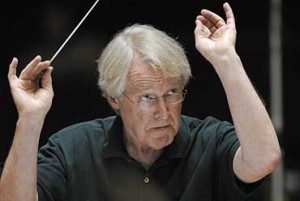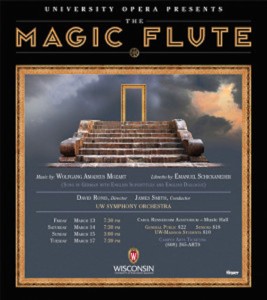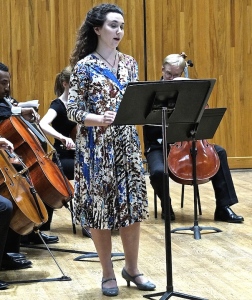The Well-Tempered Ear
Classical music: Did she know or didn’t she? Here is the factual background about a flawed diva if you go to see the movies “Florence Foster Jenkins” or “Marguerite”
4 Comments
By Jacob Stockinger
This week, The Ear saw the movie “Florence Foster Jenkins,” a story about the amateur singer Florence Foster Jenkins (below, in the 1920s in a photo from Getty Images), who was famous in the early- to mid-20th-century for singing terribly, painfully and laughably off-key but who nonetheless pursued performing in public and sold a lot of records.
During the Wisconsin Film Festival, The Ear also saw a French movie, “Marguerite,” with a similar story line and main character.
Of the two, he much preferred “Florence Foster Jenkins.” Meryl Streep (below) plays the flawed diva with total commitment. The Ear suspects it will garner Streep, who did her own bad singing to perfection, her 20th Academy Award nomination, even if she doesn’t win a fourth Oscar.
British actor Hugh Grant might also be nominated for his supporting role as the British out-of-work actor who becomes her protector, promoter and caring love partner St. Clair Bayfield.
In additon, her piano accompanist Cosmé McMoon, played by Simon Helberg, who could also receive an Oscar nomination, develops into a memorable secondary character.
The English script — directed by the talented Stephen Frears –seemed more tightly written with better characters and dialogue than the French one, which dragged on too long and seemed forced in its ending, although both movies share similarities in their endings.
But to be honest, with both of the films The Ear had a major problem with suspending disbelief.
He just can’t believe that Jenkins didn’t know how badly she sang.
You can hear her butcher the famous and difficult “Queen of the Night” aria from “The Magic Flute” by Wolfgang Amadeus Mozart, in the YouTube video at the bottom.
Anyway, the Deceptive Cadence blog for NPR, or National Public Radio, has provided an excellent background piece, a very factual biography of Jenkins, that also asks famous singers whether it is possible for Jenkins not to have known how flawed her singing was.
All The Ear knows is that if he played the piano that badly, he sure wouldn’t go perform a recital in Carnegie Hall.
Here is a link to the blog piece by Tom Huizenga:
Now if you go to either or both movies, here is what The Ear wants to know:
Which film about Florence Foster Jenkins did you prefer, and why?
And do you think it is possible to sing as badly as Jenkins did without knowing it?
The Ear wants to hear.
Tags: Academy Award, accompanist, accompany, advertising, amateur, American, aria, Arts, blog, Carnegie Hall, characters, choral music, Classical music, Davenport, dialogue, film, Florence Foster Jenkins, French, Hugh Grant, Jacob Stockinger, Magic Flute, Marguerite, Meryl Streep, movie, Mozart, Music, National Public Radio, New York, New York City, opera, Oscar, Piano, Queen of the Night, Stephen Frears, supporting actor, United States, University of Wisconsin-Madison School of Music, University of Wisconsin–Madison, Wisconsin Film Festival, Wolfgang Amadeus Mozart, YouTube
Classical music: University Opera’s exotic East-West production of Mozart’s “The Magic Flute” opens this Friday night and runs for four performances.
2 Comments
ALERT: The new season of the Madison Symphony Orchestra will be announced here starting at midnight tonight.
By Jacob Stockinger
The University Opera and University of Wisconsin-Madison School of Music have sent out the following announcement about an upcoming production.
From March 13 to 17, University Opera will present the beloved masterpiece of fantasy, The Magic Flute, by Wolfgang Amadeus Mozart (below) in a family-friendly, exotic East-West staging.
In a departure, the opera will run for four performances instead of the usual three, adding a Saturday evening show that will allow lead roles will be split evenly among singers. The show will involve over 80 singers, instrumentalists and stage crew members.
Performances are Friday, March 13, 7:30 p.m.; Saturday, March 14, 7:30 p.m.; Sunday, March 15, 3 p.m.; and Tuesday, March 17, 7:30 p.m.
Tickets are $22 for the general public, $18 for senior citizens and $10 for UW-Madison students, available in advance through the Campus Arts Ticketing office at (608) 265-ARTS and online at http://www.arts.wisc.edu/ (click “box office”).
Tickets can also be purchased in person at the Wisconsin Union Theater Box Office Monday-Friday, 11:30 a.m.-5:30 p.m. and Saturdays, noon-5 p.m. and the Vilas Hall Box Office, Monday-Friday, 11:30 a.m.-5:30 p.m., and after 5:30 p.m. on University Theatre performance evenings.
Because shows often sell out, advance purchase is recommended. If unsold tickets remain, they may be purchased at the door beginning one hour before the performance.
The Carol Rennebohm Auditorium is located in Music Hall (below), at the foot of Bascom Hill on Park Street.
The Magic Flute marks the second production by Interim Opera Director David Ronis (below top, in a photo by Luke DeLalio) at the University of Wisconsin-Madison. Ronis recently earned distinction when his 2014 production of Dialogues of the Carmelites by Francis Poulenc at Queens College in New York was awarded third prize in the National Opera Association’s Opera Production Competition. James Smith (below bottom), conducting the UW Symphony Orchestra.
Full of surprises and delights, The Magic Flute is a treat for both seasoned opera lovers and those new to opera.
The familiar plot centers on Prince Tamino, sent by the Queen of the Night to rescue her daughter, Pamina, from the Sorcerer, Sarastro.
As the opera unfolds, Tamino’s quest for love evolves into one in which self-actualization becomes equally important. Along for the ride are Papageno, his comic sidekick, searching for his own soul mate; the Queen’s Three Ladies; Three Spirits who serve as guides; and an assortment of other memorable characters.
Ronis comments about his concept for The Magic Flute: “When planning the production, I kept seeing Sarastro and his Masonic principles as being related to those of Eastern philosophy. So, in order to create the polarity between the opposing forces of Sarastro and the Queen of the Night, I characterized Sarastro as coming from the East vs. the Queen of the Night, coming from the cultural West.
“Thus, the Queen and her Ladies wear Victorian bustle dresses, while the basic costume for Sarastro’s followers is the shalwar kameez, the traditional garment of South and Central Asia.
“To complement this, the scenic design combines pan-Asian, Victorian, and surreal elements with a few contemporary comedic references thrown in. This works nicely, framing the story as well as creating an exotic environment in which the fantasy can take place.”
The large cast of The Magic Flute includes Thomas Leighton and William Ottow, who will split the performances as Tamino, Nicole Heinen and Anna Whiteway (below) as Pamina, and Joel Rathmann and Brian Schneider as Papageno. The Queen of the Night will be played by Sarah Richardson and alumna Olivia Pogodzinski, and the role of Sarastro will be taken by alum Thomas Weis. (You can hear the Queen of the Night’s famously difficult and haunting aria, performed by Natalie Dessay, in a YouTube video at the bottom.)
The six singers playing the Three Ladies will be Susanna Beerheide, Tia Cleveland, Jessica Kasinski, Kirsten Larson, Heather Richardson, and Sheila Wilhelmi. Rounding out the cast will be Alaina Carlson, Eileen Peterson, and Emily Weaver as the Three Spirits; Emi Chen and Gaby Klugman as Papagena; Nathaniel Greenhill and Michael Hoke as Monostatos; alum Benjamin Li as the Speaker; conductor and violist Mikko Utevsky (below) as the Second Priest; and Evan Esslinger and Fabian Qamar as the Armored Men. Assisting Maestro Smith will be Kyle Knox, assistant conductor; Seungwha Baek and Chan Mi Jean, musical preparation; and Dennis Gotkowski, chorus master.
The physical production will be based on designs by Charles “Jen” Trieloff II and realized by Joseph Varga, Greg Silver, and Liz Rathke. Costume design is by Sydney Krieger, Hyewon Park and Sam Fleming, lighting design by Rob Stepek, props design by Dana Fralick, and the production stage manager will be Erin McDermott. Student staff include Emi Chen, costume assistant; Fabian Qamar, props assistant; Emily Hake and Melanie Treuhaft, scenic painters; Briana Miller, master electrician; and Kyle Baldauf, assistant carpenter.
This production of The Magic Flute is dedicated to the memories of Karen K. Bishop and Charles Jennings Trieloff II. Bishop was an UW-Madison alumna who performed in a number of University Opera productions between 2007 and 2011. Trieloff was the original set designer for the production.
University Opera is a cultural service of the School of Music at the University of Wisconsin-Madison. Its mission is to provide comprehensive operatic training and performance opportunities for students and operatic programming to the community. For more information, contact opera@music.wisc.edu or visit the School of Music’s web site at music.wisc.edu.
Tags: Arts, choral music, Classical music, David Ronis, Dialogues of the Carmelites, Jacob Stockinger, Madison, Mozart, Music, Natalie Dessay, National Opera Association, opera, Orchestra, Poulenc, Queen of the Night, Queens College, The Magic Flute, University of Wisconsin-Madison School of Music, University of Wisconsin–Madison, University Opera, vocal music, Wisconsin, Wolfgang Amadeus Mozart, YouTube
















